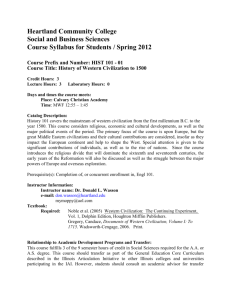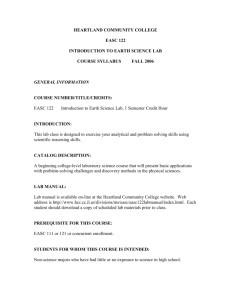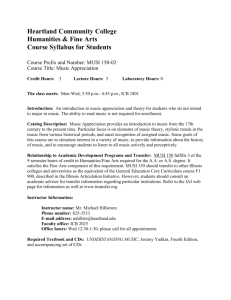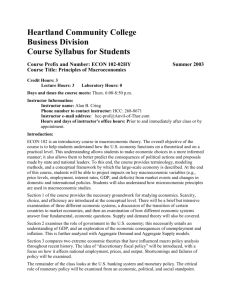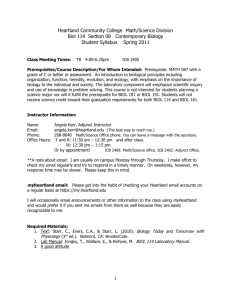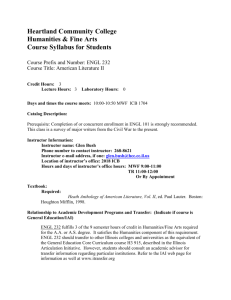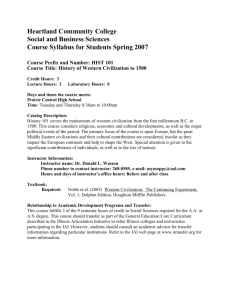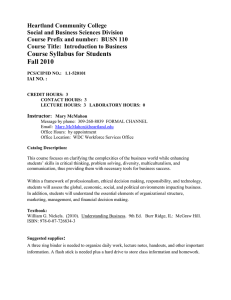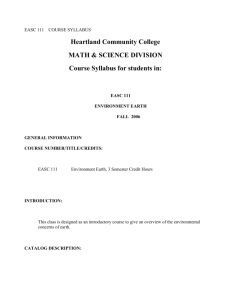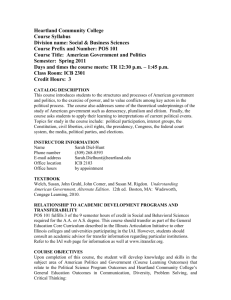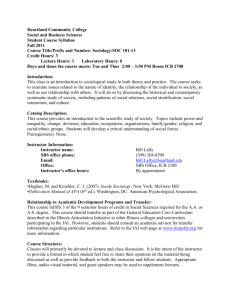EASC 121 - Bob Dennison - Heartland Community College
advertisement
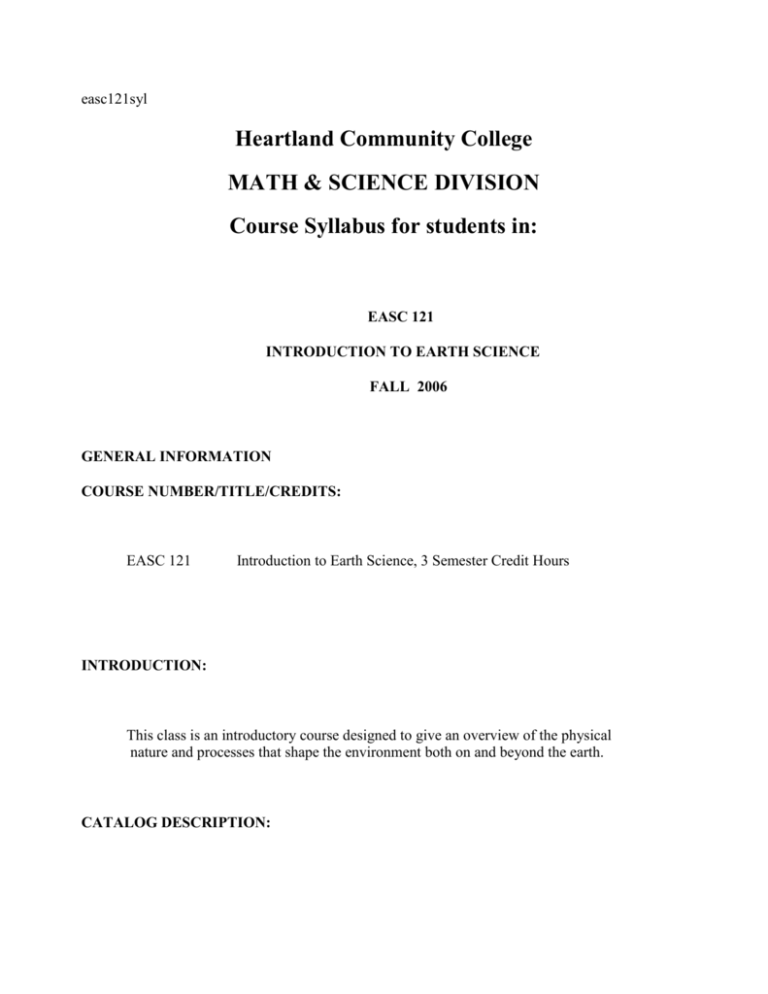
easc121syl Heartland Community College MATH & SCIENCE DIVISION Course Syllabus for students in: EASC 121 INTRODUCTION TO EARTH SCIENCE FALL 2006 GENERAL INFORMATION COURSE NUMBER/TITLE/CREDITS: EASC 121 Introduction to Earth Science, 3 Semester Credit Hours INTRODUCTION: This class is an introductory course designed to give an overview of the physical nature and processes that shape the environment both on and beyond the earth. CATALOG DESCRIPTION: An introductory physical science class that surveys the fields of geology, oceanography, atmospheric science and astronomy. Environmental concerns will be discussed in this class. Suitable for students with minimal course work in the sciences and mathematics.. TEXTBOOKS: Earth Science, Tenth Edition, Tarbuck and Lutgens, Prentice Hall. PREREQUISITE FOR THIS COURSE: None. STUDENTS FOR WHOM THIS COURSE IS INTENDED: Non-science majors who my have had little or no exposure to this topic in high school. INSTRUCTOR INFORMATION: Name: Bob Dennison Office: ICB 2408 Phone: (309) 268-8646 Email: robert.dennison@heartland.edu Office Hours : Tuesday from 12:15 - 1:15 Monday/Wednesday/Thursday/Friday from 10:00 - 11:00 COURSE PURPOSE GENERAL COURSE GOALS: 1. 2. 3. 4. Understanding of the basic areas of astronomy, oceanography, atmospheric science, geology and geomorphology. Increasing analytical and reasoning skills. Understanding basic physical science terms and concepts. Aiding students in their ability to assess and make informed environmental decisions. RELATIONSHIP OF COURSE TO STUDENT ACADEMIC DEVELOPMENT EASC 121 provides a basic scientific foundation necessary for further college-level courses. RELATIONSHIP OF COURSE TO GENERAL EDUCATIONAL REQUIREMENTS This class will fulfill lab science credit in the A. A. and A. S. degree requirements. EDUCATIONAL BELIEFS: BELIEFS ABOUT STUDENT LEARNING: Students must take an active role in the learning process for it to take place and for you to feel a sense of accomplishment. Desire, effort, and persistence are the key ingredients to your success. BELIEFS ABOUT TEACHER’S ROLE: I will be responsible for creating an atmosphere conducive to the learning process. Please feel free to ask me questions either during your class period or my office hours or whenever we can make a connection. DESCRIPTION OF INSTRUCTIONAL TECHNIQUES AND RATIONALE: Discussions, tests, quizzes, and written reports. Students will have the opportunity to ask questions and contribute throughout. DESCRIPTION OF LEARNING FORMAT: Students will be able to achieve success by: 1. 2. 3. 4. 5. 6. 7. 8. 9. 10. Attending class sessions regularly. Participating in discussions and group work. Asking questions about material you do not understand. Doing careful, thoughtful and thorough work. Reading the assigned material before class lecture and again afterwards. Taking good notes and reviewing them regularly. Reviewing the key terms and questions at the end of each chapter. Reviewing the material listed on your test review sheets. Forming a study group with other members of this class. Attending class on time.. FEEDBACK AND GRADING GRADING SYSTEM/METHOD OF EVALUATION: Scale: A > 90%, B = 80-89%, C = 70-79%, D =60-69%, F<60%. Five exams over the lectures are planned. Your four highest test scores will be added together and the lowest grade will be dropped but you must take the final exam. The exams will be worth 2/3 of your grade. The remaining 1/3 will come from quizzes, written assignments, class participation, and attendance. No makeup tests will be given. If you miss a test you will receive a grade of “0” and that score will be the one dropped in calculating your total points. There is no makeup allowed for quizzes and all assignments must be turned in on time. NO LATE WORK ALLOWED. POLICIES ON ASSIGNMENTS/TESTS/MAKEUPS : No makeup for tests, assignments or quizzes. Assignments are due per the instructor’s direction. No exceptions to this rule will be granted. POLICIES ON ATTENDANCE: Regular class attendance [including being on time] is an important part of educational success and is expected of all students. You are responsible for the information presented in each class for the lecture exams. ACADEMIC INTEGRITY Academic integrity is a fundamental principle of collegial life at Heartland Community College and is essential to the credibility of the College’s educational programs. Moreover, because grading may be competitive, students who misrepresent their academic work violate the right of their fellow students. The College, therefore, views any act of academic dishonest as a serious offense requiring disciplinary measures, including course failure, suspension, and even expulsion from the College. In addition, an act of academic dishonesty may have unforeseen effects far beyond any officially imposed penalties. Violations of academic integrity include, but are not limited to cheating, aiding or suborning cheating or other acts of academic dishonesty, plagiarism, misrepresentation of data, falsification of academic records or documents and unauthorized access to computerized academic or administrative records or systems. Definitions of these violations may be found in the college catalog. Plagiarism Plagiarism is the presenting of others’ ideas as if they were your own. When you write a paper, create a project, do a presentation or create anything original, it is assumed that all the work, except for that which is attributed to another author or creator, is your own. Plagiarism is considered a serious academic offense and may take the following forms: Copying word-for-word from another source and not giving that source credit. Paraphrasing the work of another and not giving that source credit. Adopting a particularly apt phrase as your own. Using an image or a copy of an image without crediting its source. Paraphrasing someone else’s line of thinking in the development of a topic as if it were your own. Receiving excessive help from a friend or elsewhere, or using another project as if it were your own. [Adapted from the Modern Language Association’s MLA Handbook for Writers of Research Papers. New York: MLA, 1995: 26] Note that word-for-word copying is not the only form of plagiarism. The penalties for plagiarism may be severe, ranging from failure on the particular piece of work, failure in the course or expulsion from school in extreme cases. Many plagiarism problems can be remedied by citing the sources of the original work. When in doubt, cite the source according to the style your instructor directs. Usually this is APA or MLA Style. Don’t be daunted by citing sources which are not books. You can cite everything – including pamphlets, maps, cereal boxes, telephone conversations, movies, television shows, Internet and world-wide web sites. Most cases of plagiarism arise from carelessness or haste. Violators often attempt to excuse themselves by saying that they were not told of the nature of plagiarism. You have been told. You must not include either the phrases or ideas of another writer in your papers without acknowledgment. Otherwise, you are stealing. Plagiarism is dishonest. It is cheating and is subject to severe penalties. It may endanger your whole career. Don’t do it. SUPPORT SERVICES Heartland Library Information http://www.heartland.edu/library The Library, located in the Students Commons Buildings at the Raab Road campus, provides Heartland students with a full range of resources including books, online journal databases, videos, newspapers, periodicals, reserves, and interlibrary loan. Librarians are available to assist in locating information. For more information please call the Library (309) 268-8200 or (309) 268-8292 Tutoring Center Heartland Community College offers tutoring in various forms at not cost to Heartland students at the Academic Support Center (ASC) in Normal and at the Pontiac and Lincoln Centers. Tutors are available at convenient times throughout the week. Study groups, group tutoring facilitated by a specially-trained tutor, are also available by request. For more information about services available at each location, please call the ASC in Normal (309) 268-8231; the Pontiac Center (815) 842-6777; the Lincoln Center (217) 735-1731. Testing Center The Testing Center provides a quiet environment for students to complete make-up exams, online exams, and exams for students with special accommodations. Students may be able to complete exams in the Testing Center if arrangements are made with their instructor. For more information, contact the Testing Center at (309) 268-8231. Open Computing Lab http://www.heartland.edu/asc/computerlab.html The Open Computing Lab provides free computing for HCC students at convenient times throughout the week. The computer lab is staffed by trained Lab Assistants and offers the use of approximately 70 computers, a scanner, a laser printer, and an electric typewriter. If you have a documented disability and wish to discuss academic accommodations, please contact: Anita Moore at 268-8249 or anita.moore@heartland.edu. CURRICULAR AND TRANSFER STATUS DEGREE/CERTIFICATE: This course counts toward completion of the A. A. Degree or the A. S. Degree. TRANSFERABILITY: Check with an advisor to get specific transfer information related to the school you wish to attend. STUDENT ASSIGNMENTS AND PURPOSE RELATIONSHIP OF COURSE GOALS TO ASSIGNMENTS: Each assignment provides background needed to achieve course goals. RATIONALE FOR COURSE CONTENT: Course content covers science fundamentals and basic techniques necessary for more advanced science courses. Topics in the class will increase earth-environment awareness. WHAT STUDENTS NEED TO BRING TO EACH LAB MEETING: 1. 2. 3. 4. 5. Pencil and pen Calculator Notebook Textbook If you bring a cell phone make certain that it is turned OFF. CALENDAR & ASSIGNMENTS ASSIGNMENTS TEST ONE MATERIAL Introduction Chapter 20 – Earth’s Place in the Universe Chapter 21 – Touring Our Solar System Chapter 12 – The Ocean Floor Chapter 14 – The Dynamic Ocean Test One TEST TWO MATERIAL Chapter 1 – Minerals: Building Blocks of Rocks Chapter 2 – Rocks Chapter 6 - Earthquakes Chapter 7 – Plate Tectonics Chapter 8 – Igneous Activity Test Two TEST THREE MATERIAL Chapter 3 - Weathering, Soil & Mass Wasting Chapter 4 – Running Water and Groundwater Chapter 5 – Glaciers, Deserts, and Wind Test Three TEST FOUR MATERIAL Chapter 15 – Composition, Structure, and Temperature Chapter 16 – Moisture, Clouds, and Precipitation Test Three TEST FIVE MATERIAL (FINAL EXAM) Chapter 17 - Air Pressure and Wind Chapter 18 – Weather Patterns and Severe Storms Test Five [Final Exam] DATES FOR EXAMS/QUIZZES You will be informed at least one week in advance of your scheduled test. Quizzes can occur with or without prior notice. FINAL EXAM SCHEDULE EASC 121 04 will have the final on Wednesday, December 13th from 12:00 - 1:50 CLASS CANCELLATION ON INTERNET Notice of Canceled Class Sessions Cancelled class sessions, for all HCC classes, will be listed under Cancelled Class Meetings in the A-Z Index and under Academic Information in the Current Students page on the HCC Web site. Go to http://www.heartland.edu/classCancellations/ to learn what classes have been cancelled for that day and the upcoming week. Be sure to check the last column, which might contain a message from the instructor. WITHDRAWAL DATES Students are responsible for officially dropping/withdrawing in writing to Student Services/Registration from a course for which they have enrolled. Drop/Withdrawal requests made by telephone will not be accepted. Last date to withdraw: Regular semester - November 8th HOME BACK TO EASC121
